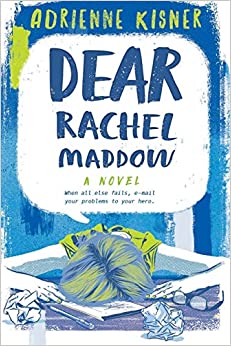 This is a book I picked up for one of my reading challenges, but I was looking forward to it even though I’m not a huge fan of epistolary novels. But I like Rachel Maddow and she always reminds me of an old friend, so I figured it would be a good read.
This is a book I picked up for one of my reading challenges, but I was looking forward to it even though I’m not a huge fan of epistolary novels. But I like Rachel Maddow and she always reminds me of an old friend, so I figured it would be a good read.
Brynn has become an under-achieving student since her older brother died and left her alone with her weak-willed mother and horrible stepfather. On top of that, she was dumped by her girlfriend over the summer. She’s in remedial classes despite being smart and eloquent because she can’t muster the will to do anything better. The one thing she loved was being on the school paper, but she was kicked off when her GPA slipped too low. She wants back on the paper, but not quite enough to do anything about it. When something happens at school that finally gets her riled up enough to do something, she surprises everyone—but she surprises herself the most.
There are a lot of great characters in the book, some good, some bad. Brynn’s ex-girlfriend Sarah is stuck-up, her tutor Lacey is a great friend (and in a wheelchair), Justin from the paper wants her to figure out how to come back, Michaela the hot new girl has a secret past, and Adam is the school’s resident nasty and entitled future politician. Her mom and stepfather are easy to dislike and her new older friends are easy to like, even if they don’t feature in the story too much.
You might wonder where Rachel Maddow fits in. Brynn watches the show every night since getting started with Sarah, and she admires Rachel. Brynn writes to Rachel for an English assignment and when she gets a response, her teacher encourages her to write back. Instead she starts writing Rachel long emails, saving them all in her drafts folder rather than sending them. Some of them also get turned in as assignments, and her teacher’s comments are hilarious. The book is entirely told through Brynn’s emails, with a few emails from other people thrown in to liven up the mix.
I mentioned that I don’t generally love epistolary novels, but I feel like this one worked. It was basically just a first person novel with a slight frame around it. Brynn’s emails are clear and full of details that tell the real story from her perspective. And although I was never super-into student government (too cynical), it’s interesting to see Brynn navigate that world. Brynn’s voice is great—funny and snarky, but not too much.
Overall, I think a lot of people will like this one. It’s got a heroine that seems to be stuck getting herself unstuck, and a sweet romance.
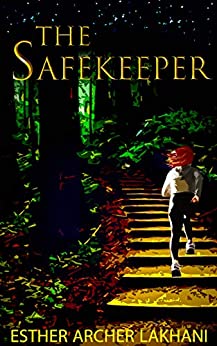 This is a really creative YA sci-fi book with what I would consider fantasy elements, which is mostly set on a contemporary Earth. It really is very unique, with an interesting premise that’s revealed over the course of the early part of the novel.
This is a really creative YA sci-fi book with what I would consider fantasy elements, which is mostly set on a contemporary Earth. It really is very unique, with an interesting premise that’s revealed over the course of the early part of the novel.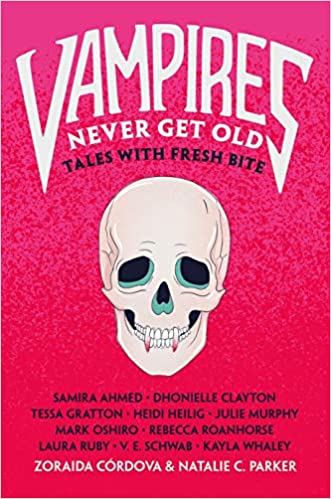 I’ve read a decent amount of vampire literature in my day, and I enjoy it. So I was looking forward to reading this collection of vampire stories. The editors really made an effort to incite a range of stories, with many diverse experiences represented. Some of the underrepresented characters include a girl who uses a wheelchair, a transgender boy, some gay kids, and several Black people.
I’ve read a decent amount of vampire literature in my day, and I enjoy it. So I was looking forward to reading this collection of vampire stories. The editors really made an effort to incite a range of stories, with many diverse experiences represented. Some of the underrepresented characters include a girl who uses a wheelchair, a transgender boy, some gay kids, and several Black people.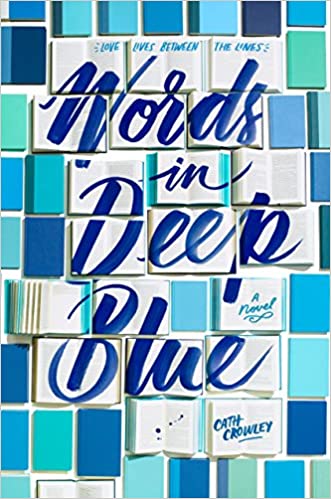 This moving book by Australian author Cath Crowley is really something. It explores grief and love in a deep way, bordering on philosophical but without straying from the novel that it is.
This moving book by Australian author Cath Crowley is really something. It explores grief and love in a deep way, bordering on philosophical but without straying from the novel that it is.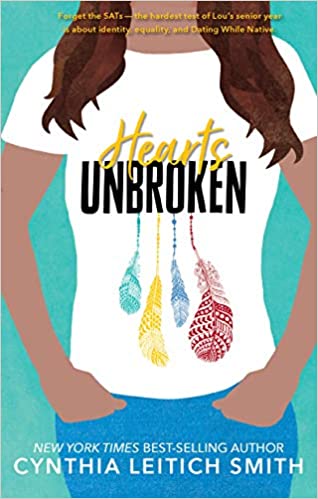 This is a rare book, featuring a Native American girl dealing with some interesting problems. The fact that her family is Native is important for a lot of reasons, including the plot and her identity. Lou is Muscogee (Creek), which was kind of cool for me because the Creek Nation extends from the southern edge of Tulsa a ways south, and the one time I went to a casino, it was the Creek Nation one that’s less than two miles from parent’ house. Not that I’m saying that casinos=Indian culture by any means, but I always find it fun to see something that is somewhat familiar to me in books I read, which rarely happens because I don’t generally live in cool places.
This is a rare book, featuring a Native American girl dealing with some interesting problems. The fact that her family is Native is important for a lot of reasons, including the plot and her identity. Lou is Muscogee (Creek), which was kind of cool for me because the Creek Nation extends from the southern edge of Tulsa a ways south, and the one time I went to a casino, it was the Creek Nation one that’s less than two miles from parent’ house. Not that I’m saying that casinos=Indian culture by any means, but I always find it fun to see something that is somewhat familiar to me in books I read, which rarely happens because I don’t generally live in cool places.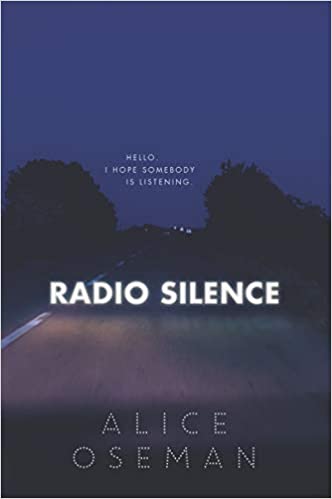 This is a hefty book for a contemporary, coming in at over 420 pages, but I enjoyed every bit of it.
This is a hefty book for a contemporary, coming in at over 420 pages, but I enjoyed every bit of it.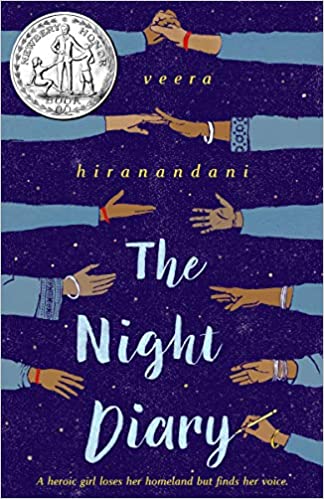 I don’t often review middle grade here (I don’t often read middle grade, either), but I’m making an exception for this book because it was so good. It also felt more borderline lower-YA to me.
I don’t often review middle grade here (I don’t often read middle grade, either), but I’m making an exception for this book because it was so good. It also felt more borderline lower-YA to me.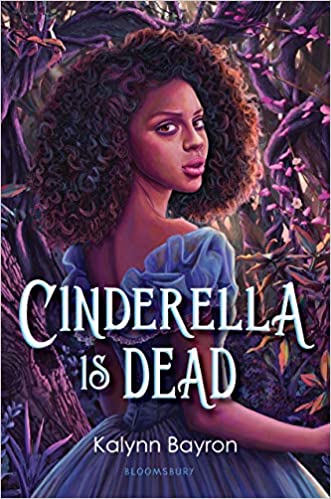 The premise of this novel is amazing. This is the magical kingdom where Cinderella found her Prince Charming, 200 years later—except everything is not all unicorns and rainbows. The current king has maintained the tradition of every sixteen-year-old girl going to the annual ball to get “selected” by the men from the kingdom. If they don’t get picked, they have to go back the next year and then the next, and if they don’t get selected by then, they’re “forfeit.” It isn’t clear to people what that means, exactly, but it’s not good. And the girls are supposed to go all out for the ball—actually, they’re supposed to be visited by the fairy godmother, if they’re "lucky" enough. But in reality, parents spend loads of money they don’t really have on dresses and everything so their daughters can be competitive at the ball. So that’s the basic setup—with a sexist medieval Western European-flavor. But there is a lot more going on than the characters know about.
The premise of this novel is amazing. This is the magical kingdom where Cinderella found her Prince Charming, 200 years later—except everything is not all unicorns and rainbows. The current king has maintained the tradition of every sixteen-year-old girl going to the annual ball to get “selected” by the men from the kingdom. If they don’t get picked, they have to go back the next year and then the next, and if they don’t get selected by then, they’re “forfeit.” It isn’t clear to people what that means, exactly, but it’s not good. And the girls are supposed to go all out for the ball—actually, they’re supposed to be visited by the fairy godmother, if they’re "lucky" enough. But in reality, parents spend loads of money they don’t really have on dresses and everything so their daughters can be competitive at the ball. So that’s the basic setup—with a sexist medieval Western European-flavor. But there is a lot more going on than the characters know about.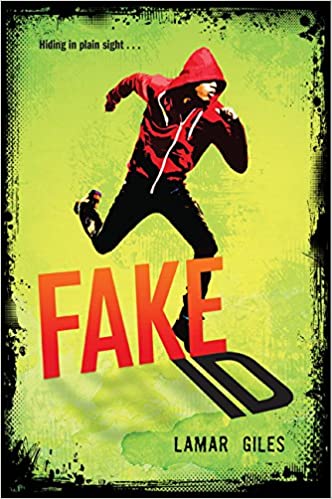 I don’t remember how I found out about this book, which originally came out in 2014, but I’m glad I did. As I’m starting to explore suspense in YA more, this is a perfect thing for me to read. I saw it compared to a Harlan Coben book, and having just read my first Coben book, I can say the comparison is apt.
I don’t remember how I found out about this book, which originally came out in 2014, but I’m glad I did. As I’m starting to explore suspense in YA more, this is a perfect thing for me to read. I saw it compared to a Harlan Coben book, and having just read my first Coben book, I can say the comparison is apt.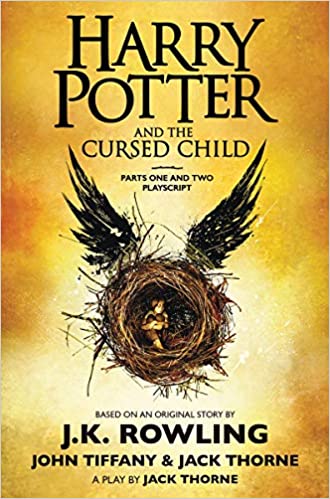 I've had this book a while and finally got around to picking it up. And I have to admit after reading it that I think it would work better as a produced play than a script (I was thinking that myself, but a friend of mine read the book and felt meh about it, but then saw the play and said it was awesome), but I still enjoyed the story.
I've had this book a while and finally got around to picking it up. And I have to admit after reading it that I think it would work better as a produced play than a script (I was thinking that myself, but a friend of mine read the book and felt meh about it, but then saw the play and said it was awesome), but I still enjoyed the story. I read this sharp Pride and Prejudice remix quickly because it really sucked me in.
I read this sharp Pride and Prejudice remix quickly because it really sucked me in.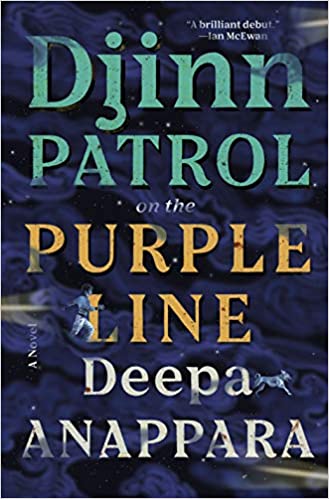 I rarely review books here that aren’t YA, but I enjoyed this one and think some of you might, as well. This is a rare suspense novel set in India (at least it’s rare to me—when I think of suspense, it’s almost always with white characters).
I rarely review books here that aren’t YA, but I enjoyed this one and think some of you might, as well. This is a rare suspense novel set in India (at least it’s rare to me—when I think of suspense, it’s almost always with white characters).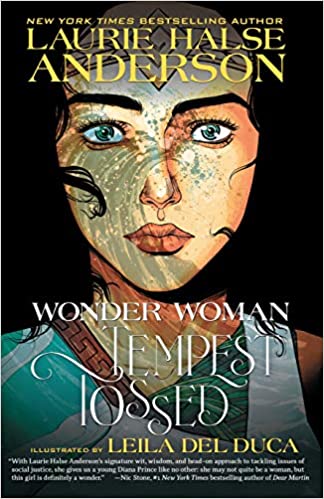 I was a little surprised to see a graphic novel by Laurie Halse Anderson, but of course I had to check it out. I'm not a superhero fan in general, but I sometimes make an exception for Wonder Woman. I'm glad I did this time. It was illustrated by an artist I wasn't familiar with, Leila del Duca, but she impressed me with her sharp style.
I was a little surprised to see a graphic novel by Laurie Halse Anderson, but of course I had to check it out. I'm not a superhero fan in general, but I sometimes make an exception for Wonder Woman. I'm glad I did this time. It was illustrated by an artist I wasn't familiar with, Leila del Duca, but she impressed me with her sharp style.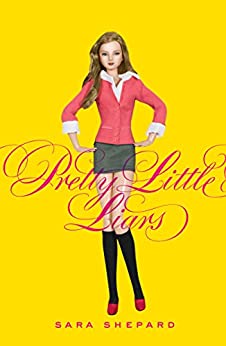 I know this book came out a while ago (2006) and is a TV show now, but I picked it up based on a recommendation for my suspense/thriller class for my MFA. I’d obviously heard of it, but never read it.
I know this book came out a while ago (2006) and is a TV show now, but I picked it up based on a recommendation for my suspense/thriller class for my MFA. I’d obviously heard of it, but never read it.